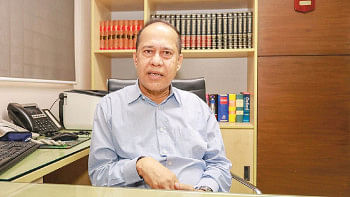The curious case of vanishing gold

In a land where financial institutions occasionally resemble scenes from a Shakespearean farce, the recent revelation of 12,000 bhori of gold mysteriously vanishing from Bangladesh Samabaya Bank Ltd could not have come at a more opportune moment. Like the climactic unmasking of a villain in a Jacobean play, the public finds itself leaning forward in their metaphorical seats, waiting for the inevitable punchline.
Let's start at the beginning: the bank's acting general manager and chief executive officer, Ahsanul Ghani, stands before the audience—excuse me, the public—and, with all the gravity of Polonius expounding on the perils of love, declares that "a bank gang was involved" and that "they have been identified through investigation." This revelation is met not with gasps of shock, but with the bemused smiles of a populace well-versed in the tragicomedy of institutional malfeasance.
It seems that at some point in 2020—no doubt while the world was preoccupied with the unfolding drama of a pandemic—members of the Narayanganj Cooperative Credit Limited decided to play the roles of enterprising rogues, borrowing against gold they had mortgaged to the bank. As if they had read too much Jonsonian comedy, they devised a plan so clever that it could only fail due to its own ridiculousness: they would return the loan money, withdraw the gold, and vanish into history as one of the most bizarrely successful heists ever perpetrated.
But alas, as in all comedies of errors, the plan was doomed by the hubris of its perpetrators. A group of "fake customers"—clearly more suited to the roles of court jesters than criminal masterminds—collaborated with bank officials to falsify documents and withdraw the gold. It is here that the tragedy of the situation gives way to humour. Who could take seriously a scheme that reads like an Elizabethan play within a play? Like the bumbling artisans of A Midsummer Night's Dream, these conspirators seem more likely to trip over their own lies than to execute a flawless robbery.
Of course, in true Shakespearean fashion, the plot thickens. After all, what is a comedy without a few mistaken identities? The fake customers, posing as members of the bankrupt Narayanganj Cooperative Credit Limited, made off with 8,000 bhori of gold, leaving behind a trail of confusion that only the Bard himself could untangle. And much like the misunderstood lovers in Much Ado About Nothing, the bank officials were caught in a web of deceit so convoluted that even the Anti-Corruption Commission (ACC)—playing the role of Dogberry, the bumbling constable—was left scratching its collective head.
At this point, it's worth pausing to reflect on the sheer theatricality of the situation. Imagine, if you will, a production of this farce set on the grand stage of Bangladesh's financial institutions, where each act reveals yet another layer of absurdity. In Act I, LGRD Adviser AF Hasan Arif delivers a solemn speech at the annual planning conference of the Bangladesh Academy for Rural Development (BARD), announcing that 12,000 bhori of gold have disappeared.
Act II introduces our hapless bankers, who, much like the protagonists of a Restoration comedy, find themselves in the middle of a scandal that is equal parts outrageous and hilarious. They claim the incident occurred three years ago and that the ACC has been diligently investigating ever since. One can almost hear the voice of Lady Bracknell from Oscar Wilde's The Importance of Being Earnest exclaiming, "Three years! How careless of them!" Indeed, it is difficult not to be reminded of Wilde's biting satire on the absurdities of Victorian society, where appearances mattered more than substance, and even the gravest matters could be reduced to a punchline.
But Act III, the climax of this farce belongs to the fake customers themselves. Like the wily Sir John Falstaff from Henry IV, these impostors managed to swindle the bank, pocketing nearly Tk 11.5 crore's worth of gold before anyone realised what had happened. And, as in all good comedies, the audience is left wondering whether to laugh or cry at the sheer audacity of it all. While Falstaff may have charmed his way out of trouble with wit and humour, our modern-day tricksters seem content to rely on the incompetence of their marks.
As we approach the denouement, one can't help but marvel at the absurdity of it all. How did so much gold simply vanish? How did a group of impostors manage to deceive an entire bank? And, perhaps most importantly, how has this farce played out for so long without anyone crying foul? The ACC, much like the ineffectual constables of The Comedy of Errors, seems content to file cases and issue statements, while the rest of us watch with a mixture of amusement and disbelief.
As in the comedies of old, where kings and courtiers are often revealed to be as flawed as the common man, so too do we find that even the most august institutions can be undone by the simplest of errors. The Samabaya Bank, like the characters in any good farce, is ultimately a victim of its own hubris, and we, the audience, are left to wonder whether this play will ever reach its final act.
In the meantime, we can only hope that the ACC—much like the ever-hopeful Dogberry—manages to bring the culprits to justice, if only for the sake of preserving the dignity of the stage on which this comedy has unfolded.
H.M. Nazmul Alam is lecturer at the Department of English and Modern Languages of the International University of Business, Agriculture and Technology (IUBAT).
Views expressed in this article are the author's own.
Follow The Daily Star Opinion on Facebook for the latest opinions, commentaries and analyses by experts and professionals. To contribute your article or letter to The Daily Star Opinion, see our guidelines for submission.

 For all latest news, follow The Daily Star's Google News channel.
For all latest news, follow The Daily Star's Google News channel. 











Comments